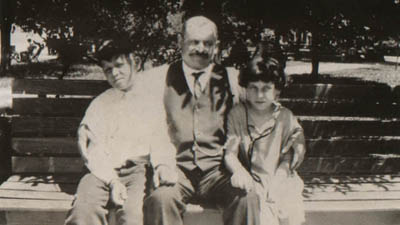Data in the cloud
In response to my weak rationalization about why I am getting an iPhone Ian asked about which web apps I use. So here they are (with the offline apps they synch with on both Mac and PC).
| function | web app | offline Mac app | offline PC app |
| Gmail | Thunderbird | Thunderbird | |
| calendar | Google Calendar | iCal* | Sunbird** |
| contacts | Plaxo | OSX Address Book | Thunderbird |
| lists/notes | Backpack | Packrat | [none] |
| project collaboration | Basecamp | [none] | [none] |
| RSS | Newsgator | NetNewsWire | FeedDemon |
| blog authoring | Movable Type | Ecto | Ecto |
[*] Does not support two-way synching.
[**] The latest build of Sunbird (0.5) does support two-way synching. If I have to do that (like on an airplane) I use Sunbird on the Mac.
Of course this says nothing of all the other data that lives out in the tuboverse. Flickr, Ancestry.com, Google Spreadsheets and on and on. But these have no desktop equivalents at all so I don’t include them here. Suffice to say, most of my most critical data lives somewhere online.
iPhone, I am ready for you if you will have me.
(HTML tables! Yay, old school layout!)
Urban oasis
A few years after the Wacker Drive demolition and rebuild the little Vietnam Memorial plaza on the Chicago River is open for passersby. Between State and Wabash on the south side. It isn’t exactly a full-on riverwalk, but it does make the waterway seem less like a gulch. Really quite nice.
This is right across from the former location of IBM in Chicago. Makes me miss the area all the more. What a great place it would have been to get away from the office hubbub. Might have even been able to rig a Wifi repeater to shoot across the river. Oh well. I’ll just sulk in the skyscraper canyon we’re now in.
For Chicago River fans out there, here’s a video of me taking the water taxi east on the main branch to the Michigan Avenue quay.
Sluicing through the blog archives I am struck at my obsession with this river. Go with the flow:
Brita City (re-engineering the river)
Escher streetscape (watching the drawbridges let sailboats in)
A unique phone call (floating past a bridge on fire)
Tipping Point (the Eastland disaster)
Available: loft apartment w/ lake and river view (man who lived in the Michigan Ave. bridge)
Man vs. sailboat (outrunning the drawbridges)
Lord of the Gizmos
Can I tell you how many times I’ve been asked: Are you getting an iPhone? No, I cannot, for I cannot count that high unassisted by spreadsheet.
People, of course I am getting an iPhone … but maybe not for the reasons you suspect.
I’ve needed a new phone since January. My trusty, bulky Sony Ericsson S710a was simply not cutting it any longer. I was prepared for a new phone but then heard that the iPhone was coming. Months in the future of course, but on the horizon. So I waited. Waited for the details to trickle in.
Not everything impressed. When I found out it would be on my current carrier Cingular I was happy. Then I remembered it was Cingular and I was sad. Because Cingular sucks, but they have good international coverage, which is the only reason I am with them. Then I learned that the iPhone would not support Cingular’s nascent 3G network. And I was really sad. This will most certainly suck.
But the real reason I am going to get one is that I am coming around to convergence — when done right. Everything I have seen suggests that this device can synthesize a phone and an iPod perfectly. True, it will not be the 80GB version I haul around, but it has caused me to rethink my iPod strategy. I carry an 80GB mostly because of long-distance travel, not for my commute. Who the hell listens to 80GB of music in a typical session on the iPod? No one. But the large capacity is ideal for when you are away from your main music library for a time and want choice.
The iPhone has me rethinking. The only other device I always have on me is my laptop and, while it does not have enough free space to house my entire collection, there are multiple options for expansion including swapping the CD drive (which I rarely use) for a second hard drive or using a tiny external drive. I might just do this. Unload the 80GB and use the iPhone exclusively for listening on the go.
The other reason the iPhone makes sense to me is coincidental. I have been moving all my critical data to web services in the last year. E-mail, bookmarks, to do lists, calendar, project plans, backups, everything is now accessible via a web interface. And this, despite the protestations of OSX developers everywhere, is the only way Apple is currently allowing developer access to the platform — through web apps. I still love offline, cross-platform access to data, but this will do for a mobile device.
So what’s my plan on Friday? Well, there is an AT&T/Cingular store right across the street from my office. As soon as I see a line form, I’m out there.
Water and fire
There was a torrential afternoon downpour yesterday that caught all three of my kids — which includes my one-year-old baby girl — and their Ghanaian babysitter in the rain at the park. They got drenched. And they loved it, especially the toddler. Apparently this is good news, for in Ghana it is said that if a baby gets rained on and does not cry it will live a long life. Who knew?
My three-year-old boy, however, has a problem. A few weeks ago we were out for a stroll and we passed the neighborhood fire department just as the engines were preparing to roll. They laid on the sirens and that really loud, low bellow before they left the station. This noise, compounded by the soundboard of the open garage and the fact that we were approximately 20 feet away, scared the daylights out of my kids. My wife and I were startled too. It was like standing on the deck of an aircraft carrier. (Not that I’d know.)
Now, whenever a fire truck blares by — and this is often as we are on a major route out of the station — my three-year-old freaks out. Runs amok, hands covering his ears, shaking, scared mindless. It has gotten so bad that if he thinks something sounds even remotely like a siren (which in the city is like background radiation) he loses it or if he thinks there’s a likelihood of fire, say, because he sees open flame on the grill, he freaks. Pavlovian, yet heartbreaking. We’ve offered to bake cookies and head to the firehouse tomorrow to have him meet the nice firefighters and confront his fears. He’s less than sure about that.
I don’t believe there is any west African folk wisdom for this problem.
Update: Thelovelywife took Andrew to the local firehouse with a platter of cookies to confront his fears.

The firefighters were totally accommodating, letting he and his brother and cousin play in the engine cab and with the hoses. And yet, Andrew had his hands at his ears the whole time — scared that there’s be a fire emergency in the neighborhood at any time. And in fact there was. Engines rolled. Tears flowed.
Moodbuster
Been in a funk all day. But the funk has broken, so to speak.
I was playing tennis with my brother, getting my ass handed to me on a platter on a crappy public court (massive weed-strewn fissures down the hardtop, sandstorm-grade dust blowing over from an abutting dog track — nice design there, city, net two cranks too low) and it was freaking hot. Perfect to maintain my stroppy disposition.
But then I see a couple near a park bench. One or both of them is deaf because they are signing like mad. Not sure if they were arguing but whatever they were saying it was intense. And then one of them gives the sign (I’m guessing here) for “Screw this, let’s SMS” and they pull out identical smartphones. They regain composure, sit down and start texting back and forth, right next to each other, happy as clams.
It was the most beautiful thing. I think I broke my brother’s serve after that.
Instant messaging peeves
In a bit of a mood today so here’s my chat annoyance list.
When status says “not available” or “do not disturb.” I have never understood this. If you are using a chat application but not accepting messages what’s the point? Log off.
“I just e-mailed you.” Yes, thank you I see your note sitting right here in my inbox. This is only slightly less annoying than people who call you to let you know that they’ve e-mailed you right after clicking send. E-mail is asynchronous, people. Look it up.
“On the phone” or, worse, “otp.” Yes, that’s why I chose to ping you instead of ring you. And if you can’t do two things at once, why are you on chat? IM isn’t for uni-taskers.
When people treat IM like an e-mail. “Dear John, I am writing you to follow up on the matter we discussed … [18 lines later] … Sincerely, Mary.” Nice selection of medium there, Mary.
“Are you using [insert app here]?” This would be like asking people if they are using Outlook before sending an e-mail. Who cares?
| 12:51 PM | Mary: you there? | |
| 12:51 PM | John: yes | |
| 1:47 PM | Mary: just seeing if you are around |
And the obverse:
| 2:15 PM | Mary: there john? | |
| 2:15 PM | Mary: hello?????? |
When you know someone is typing (“Mary is typing …”) and it takes forever. People, put down the Strunk and White and hit return. Chat. Not oration.
OK, all done. Damn you, Mary.
Beauty in the breakdown
Not sure why it has taken me to so long to upload this, but here’s a great time-lapse video from the winter of 2004-2005 of the deconstruction of the Sun-Times building from the IBM building. A monument to the pre-Trump era. Click for video.

Thanks to Jack Blanchard and Jeff Berg.
Man, I miss that view.
“Gone out of experience”
The New Yorker has a fascinating article on an Amazonian tribe called the Pirahã.
What makes this tribe special is that their language defies a major linguistic theory, championed by Noam Chomsky, that posits a “universal grammar” embedded in the human brain that explains the structural similarity between every language on Earth. In a nutshell, this theory claims that all languages are shaped by a unique biologically-based human ability to create recursive thought structures. What’s that? Well, basically, it is inserting one thought into another. Such as the combination of “A dog is barking” and “The dog has fleas” into “The dog which has fleas is barking.”
The Pirahã don’t do this. Indeed, it appears that they can’t. They simply do not think this way because, in essence, recursion is based on abstraction and the Pirahã do not deal with abstraction.
… the Pirahã perceive reality solely according to what exists within the boundaries of their direct experience — which Everett defined as anything that they can see and hear, or that someone living has seen and heard. “When someone walks around a bend in the river, the Pirahã say that the person has not simply gone away but xibipío — ‘gone out of experience,’” Everett said. “They use the same phrase when a candle flame flickers. The light ‘goes in and out of experience.’”
This has set the linguistic world, much of which subscribes to the Chomskyan belief in an innate, biological basis for the structure of language, on its ear.
I’ve had a passing interest in linguistics since grad school and I bounce around the periphery of ongoing debate, but what really interested me about this piece is how much it reminded me of a comment my son made last year, which I wrote about:
Recently as we passed some strangers on the street he asked “What happens to people when you don’t see them anymore?” He was hovering around asking whether they ceased to exist, though he never actually said so. We explained that they kept on living their own lives and that we’d probably never see them again. This saddened him a bit, though only slightly less that it puzzled him. I think he’s only just realizing that the sum of human experience is a superset of his own.
That got me thinking about the “universal grammar” concept. Maybe abstraction is not biologically-based but learned. But it went further:
… he’s even more obsessed with names. He simply cannot understand how there can be things that do not have names. He constantly asks about how something can exist if it doesn’t have a name. I explain that there are thousands (millions?) of species of animals, mostly small critters, that we suspect exist but have not been discovered and so have not named. Not to mention undiscovered stars, comets, planets and new concepts, future fashion trends, and dance moves…. Like Adam naming stuff in Eden, the power to name is the power to make real for my boy.
So, there it is. One researcher in the Amazon jungle and one little boy in Chicago, both defying the reigning theory on the origin of language. Perhaps my son has Pirahã blood in his veins (though his genography says no).
Wimbledon comes to Second Life (again)
One could argue that it was Wimbledon last year that really jump-started IBM’s involvement in virtual worlds. Before all the hype, before the “but I need a first life!” meme, before IBM committed itself to the space, a small crew of talented developers out of Hursley, England capitalized on IBM’s long relationship with Wimbledon* by creating a rudimentary centre court in Second Life. From there it’s really a blur.

Fast forward a year and the new Wimbledon build on one of the official IBM islands is a good showcase of how far we’ve come. Real-time shot trajectory plotting in 3D, weather plotting, scoreboards, video playback, a shop, and a backdrop for posing your avatar against actual photos from the All England club.
Eightbar has the full scoop, of course.
If you’ve got Second Life, have a visit.
[*] After The Hermitage, the Wimbledon webcasts of 1999 and 2000 were my next projects in IBM. There’s been nothing quite like the adrenalin of those days, coordinating live event coverage with outrageous traffic and no caching. (OK, almost nothing like it.)


















